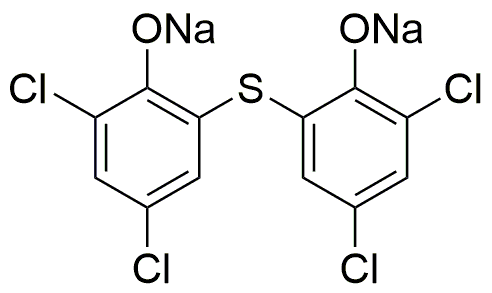Bithionol disodium salt is widely utilized in research focused on:
- Antimicrobial Applications: This compound is effective against a variety of bacteria and fungi, making it valuable in developing new antimicrobial agents for pharmaceuticals.
- Veterinary Medicine: Bithionol disodium salt is used in treatments for parasitic infections in animals, helping to improve livestock health and productivity.
- Research in Toxicology: Its properties allow researchers to study the effects of chlorinated compounds on biological systems, contributing to understanding environmental toxicity.
- Pharmaceutical Formulations: The compound serves as an active ingredient in certain medications, providing benefits in treating skin infections and other ailments.
- Analytical Chemistry: Bithionol disodium salt is used as a standard in various analytical techniques, aiding in the detection and quantification of similar compounds in complex mixtures.
General Information
Properties
Safety and Regulations
Applications
Bithionol disodium salt is widely utilized in research focused on:
- Antimicrobial Applications: This compound is effective against a variety of bacteria and fungi, making it valuable in developing new antimicrobial agents for pharmaceuticals.
- Veterinary Medicine: Bithionol disodium salt is used in treatments for parasitic infections in animals, helping to improve livestock health and productivity.
- Research in Toxicology: Its properties allow researchers to study the effects of chlorinated compounds on biological systems, contributing to understanding environmental toxicity.
- Pharmaceutical Formulations: The compound serves as an active ingredient in certain medications, providing benefits in treating skin infections and other ailments.
- Analytical Chemistry: Bithionol disodium salt is used as a standard in various analytical techniques, aiding in the detection and quantification of similar compounds in complex mixtures.
Documents
Safety Data Sheets (SDS)
The SDS provides comprehensive safety information on handling, storage, and disposal of the product.
Product Specification (PS)
The PS provides a comprehensive breakdown of the product’s properties, including chemical composition, physical state, purity, and storage requirements. It also details acceptable quality ranges and the product's intended applications.
Certificates of Analysis (COA)
Search for Certificates of Analysis (COA) by entering the products Lot Number. Lot and Batch Numbers can be found on a product’s label following the words ‘Lot’ or ‘Batch’.
*Catalog Number
*Lot Number
Certificates Of Origin (COO)
This COO confirms the country where the product was manufactured, and also details the materials and components used in it and whether it is derived from natural, synthetic, or other specific sources. This certificate may be required for customs, trade, and regulatory compliance.
*Catalog Number
*Lot Number
Safety Data Sheets (SDS)
The SDS provides comprehensive safety information on handling, storage, and disposal of the product.
DownloadProduct Specification (PS)
The PS provides a comprehensive breakdown of the product’s properties, including chemical composition, physical state, purity, and storage requirements. It also details acceptable quality ranges and the product's intended applications.
DownloadCertificates of Analysis (COA)
Search for Certificates of Analysis (COA) by entering the products Lot Number. Lot and Batch Numbers can be found on a product’s label following the words ‘Lot’ or ‘Batch’.
*Catalog Number
*Lot Number
Certificates Of Origin (COO)
This COO confirms the country where the product was manufactured, and also details the materials and components used in it and whether it is derived from natural, synthetic, or other specific sources. This certificate may be required for customs, trade, and regulatory compliance.


